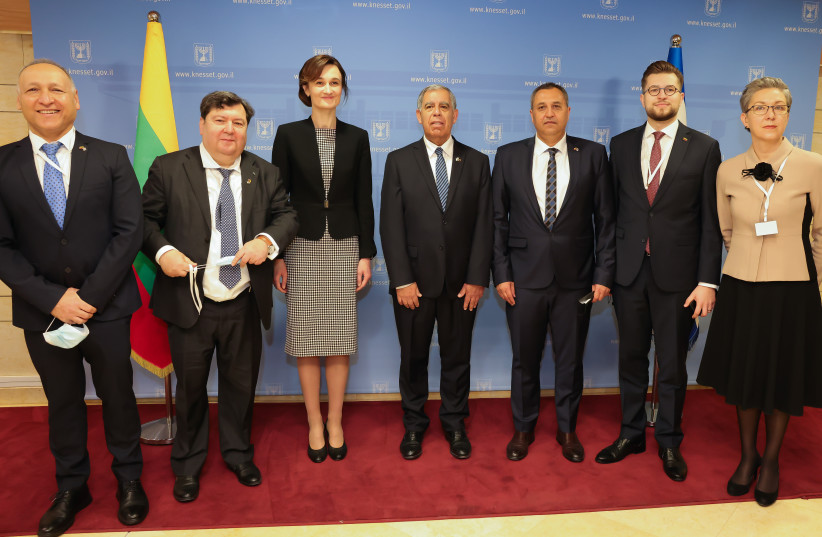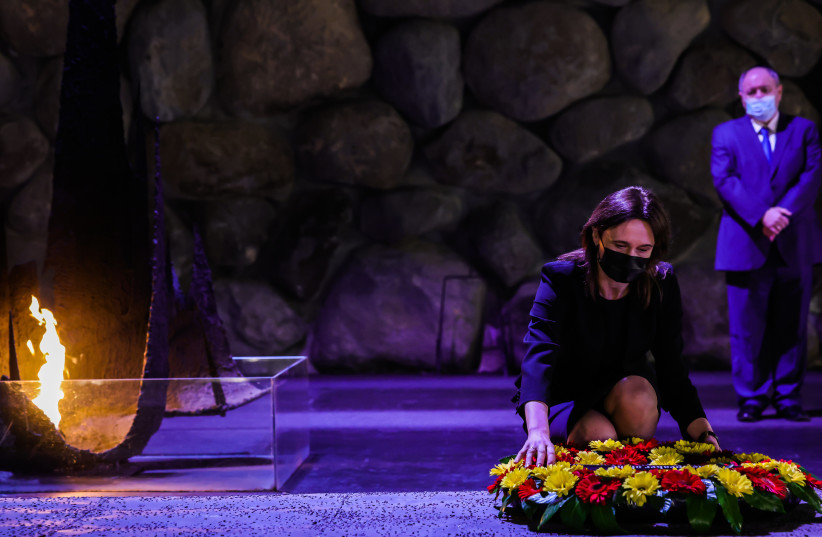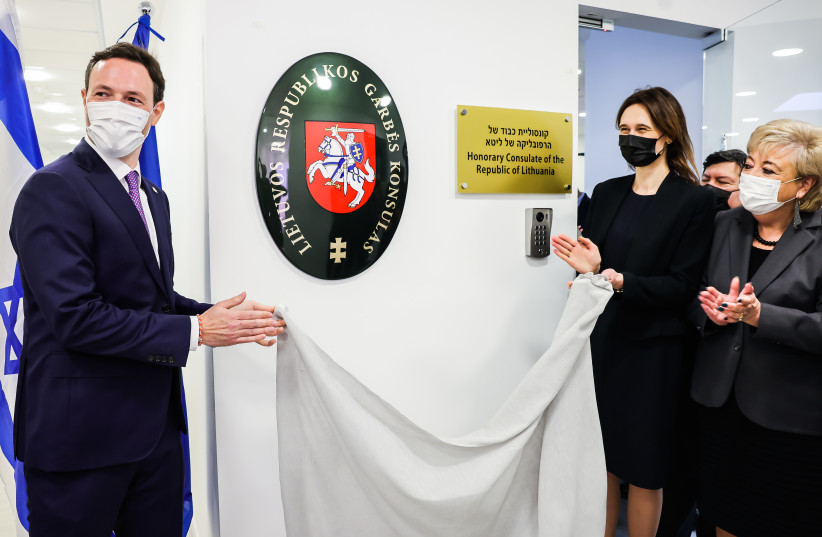Israel has not blocked the transfer of Israeli-made weapons from the Baltic states to Ukraine, according to Lithuanian Parliament Speaker Viktorija Čmilytė-Nielsen. In an exclusive interview with The Jerusalem Report during her first visit to Israel in early February after she and her parliamentary delegation had met with Israeli officials, I asked her about press reports suggesting that Israel had stopped the dispatch of arms from Lithuania, Latvia, and Estonia to placate Russia.
“We have discussed it during our meetings and we have heard a reassuring answer from the Israeli side that this information is false. It is simply not true,” Čmilytė-Nielsen said. “This is, of course, very important for us because what is happening right now on the Ukrainian border is a test for the international community of democracies. And it is very important at this point especially that we show solidarity with Ukraine, and also that we show strength; that we are a strong community of democracies, and that non-democratic states cannot just bully and expand, hoping that they will find some weaknesses or perhaps some small disagreements within our alliances.”
Čmilytė-Nielsen was in Israel on a three-day visit at the invitation of her Israeli counterpart, Mickey Levy, to celebrate 30 years of diplomatic ties between Israel and Lithuania. Her delegation included Emanuelis Zingeris, a veteran Jewish member of the Seimas and chairman of its foreign affairs committee, and Lukas Savickas, a relatively new member of parliament. The visit was packed with meetings that included one with Levy and Foreign Affairs and Defense Committee chairman Ram Ben Barak in the Knesset, and with President Isaac Herzog at the President’s Residence.
“I am honored to celebrate 30 years of diplomatic ties with my Lithuanian colleague Viktorija Čmilytė-Nielsen and her parliamentary delegation,” Levy said. “We had a good meeting that strengthens our parliamentary relationship, and I asked Lithuania to open a permanent office in Jerusalem. I respectfully accepted her kind invitation to visit Lithuania, and expressed my appreciation for her work and commitment to preserving the memory of the Holocaust and fighting antisemitism.”
Čmilytė-Nielsen’s political career began in 2015, when she was elected to replace Remigijus Šimašius in the Seimas, the Lithuanian parliament, for the Liberal Movement. She rose up the party ranks, becoming opposition leader and chair of the Liberal Movement in 2019, and lead the party into the 2020 parliamentary election, in which they won 13 seats.

Born on August 6, 1983, in Šiauliai, the fourth-largest city in Lithuania. (Before the Holocaust, the city also known as Shavel had 8,000 Jews, most of whom were murdered or transferred to Nazi concentration camps and by the end of World War II, only 500 survived.) Čmilytė-Nielsen graduated from the University of Latvia with a degree in English philology in 2007. She is also an accomplished chess player who was awarded the title “Grandmaster” in 2010, was European women’s champion in 2011, and is a two-time Lithuanian champion. She is married to Danish chess grandmaster Peter Heine Nielsen, and they have four children.
What follows are selected parts of an hour-long interview in the VIP lounge at the Inbal Jerusalem Hotel on February 8.
<br>How has your visit to Israel been?
It’s a three-day visit connected to the very nice occasion of 30 years of our diplomatic relations. I and a Lithuanian parliamentary delegation came here at the invitation of the speaker of the Knesset, whom we met today, so it’s basically connected to the symbolic date but of course it’s also much more than that. The relations and connections between Lithuania and Israel have matured and developed over the past three decades. There are a lot of opportunities for the further strengthening of our cooperation, and that’s something that we spoke about a lot. It’s an intensive visit that will mean that our parliaments will have even closer cooperation in the future.

How are you impressed by your first visit to Jerusalem?
It’s a wonderful city. I haven’t had a chance to see so much because we’ve had meeting after meeting after meeting, which is normal during such visits. We’ve been blessed with very beautiful weather so yes, it’s been very nice. Yesterday we started our visit by going to Yad Vashem, and then we also went to Netanya, where we opened the honorary consulate of Lithuania. I had a chance to congratulate the honorary consul, Shai Schnitzer, and then we had other meetings here with Litvaks, members of the Lithuanian community in Israel, which is quite vibrant and numerous. We also had a very nice meeting with a survivor of the Holocaust, a Litvak, at the ambassador’s residence, and hearing his story was an experience that will stay basically forever. So I’ve had a lot of interesting and thought-provoking meetings.
Is it what you expected?
Yes and no. I think I could say that the visit to Yad Vashem was so emotional for someone like me who comes from Šiauliai. It’s not a very big city, but pre-World War II it was home to 30,000 people, and a quarter of them were Jewish. Being at Yad Vashem was hard, and Lithuania has very black pages of history (only 500 Jews survived of 8,000 still living in Shavel in 1941), but it’s an experience that will stay with me forever, I’m sure.
How do you see relations between Lithuania and Israel?
Generally we are good partners, and in international forums it is obvious that Israel is our closest and main partner in the region, and we also have a lot to build upon in the future. We see Israel as the cradle of innovation, of science, and a country of responsible people who take the security and safety of the state very seriously, and are an example to many countries and to Lithuania as well, as also being a small country in a tricky geopolitical neighborhood. So we have a lot in common as well, and well I hope that Israel sees us as a reliable partner and a committed member of the European Union, a member that is vocal on democracy, on human rights, and as a country that has respect for human rights both inside our country and when it comes to our neighborhood. I think that we have a lot in common and in terms of values, it is clear from the meetings we had with the leaders of the State of Israel that we share the same values and we have so many things that connect us.
While our states are celebrating 30 years of diplomatic relations, it is clear that the history of Lithuanians and Jews have been so intertwined for the last 700 years. Just two years ago, we had a celebration and the whole year was dedicated to the Vilna Gaon and to the history of Jews in Lithuania. It was a chance to look back and see what an important part of Lithuanian history and culture is connected to the community.

What is the situation of the Jewish community in Lithuania?
The Jewish community is not so numerous – there are about 4,000 Jews living in Lithuania right now. But the community is quite active, and there have been a lot of initiatives for the commemoration of the Holocaust in Lithuania. I myself had a chance to participate in a few remarkable initiatives that were taken up with the active participation and initiative of the Jewish community of Lithuania. For instance, we opened a monument to the Righteous of the Nations in my hometown, Šiauliai, just a couple of months ago. We had some Litvaks attending who were saved by the Righteous of the Nations – in Lithuania, we have 918 [Righteous of the Nations] until today. In November, we went to a very small village in Lithuania where a street was named for the Righteous of the Nations, because many Jews were saved there.
When I was in Yad Vashem, I said it’s obvious that in order to shed light on the very dark pages of our history, we must remember the names and faces of the victims, we must talk openly about the executions – and in Lithuania’s case, it is a very painful theme – and we also have to honor those who risked their lives and the lives of their loved ones to save those who were in danger. I believe that this is a theme on which we can build for the future as well. I see the Jewish community as playing a leading part in this.
<br>Is Lithuania doing enough to face up to its past and educate the new generation?
I believe that things are progressing. We talked about it in our meetings with the Litvaks here in Israel, and cooperate closely on it with the Jewish community in Lithuania. Over the past few decades, there has been an enormous change. About 500 teachers from Lithuania have come to Yad Vashem, taken courses and came back to teach kids. I know that my children at school get the facts, they get the real story, as opposed to decades ago. So yes, there is definitely progress, and there are also plans that are taking place now over the next five years to update the curriculum about how we teach the Holocaust, in terms of tolerance, human rights, to make sure that there is no xenophobia and no antisemitism. These themes are very important in the Lithuania of today, and I believe we have made progress, which is not to say there aren’t problems. Of course, there are still problems and issues to solve.
<br>How do you see the Russia-Ukraine crisis through Lithuanian eyes?
Let me start by saying that sometimes it’s called the Russian-Ukraine Conflict, but in reality, there is one sovereign country that has been attacked and part of which has been occupied, and which is threatened once again. It just shows that even in the 21st century, the inviolability of international law and the respect for fundamental human rights are still being questioned, which means that this fight is never over and it’s tested all the time. Red lines are being pushed all the time, so it’s very important that the international community is unified in a clear signal to Russia, the aggressor in this case, on that as well as the rest of the things that cannot be tolerated.
<br>Do you think your chess experience has helped your political career?
I think chess experience generally helps in all alleys of life, and it’s a sport that trains a lot of important skills. First and foremost, I think the main skill and quality it teachers, strangely enough, is an ability to lose, as you have to lose a lot of games in chess in order to become good. One of the very wise coaches who I met when I was still a kid told me that you needn’t be upset when you lose a game, because in order to become good you have to lose about a thousand games. So don’t get upset every time. It teaches you to lose graciously, and I think that is an important skill in life, apart from obvious things like determination, an ability to concentrate, training memory, and all the other things that chess is good at and so useful for.
Chess is definitely good, but of course, compared with politics, chess is a very straightforward game and it’s very clean. When two chess players sit at the chessboard, you know the rules, you can only rely on yourself and you cannot cheat. So chess players including very strong chess players tend to be a bit naive in life. Politics can also be compared to a game, but the difference is that the rules are so much more tricky and vague.
<br>Do you have a hero?
I don’t have one hero, and probably that comes from chess because in chess it’s kind of limiting to have one chess player, one grandmaster, who you would follow. Normally you take a little bit from this guy and a little bit from another – maybe someone has a good opening or very original ideas in the endgame or has an interesting touch – and then it translates to life as well. So no, I don’t have one hero.
But in politics, I’m generally very inspired by the women leaders whom I meet and see, especially young females who bring interesting and nice touches to present challenges that the world is dealing with, so I always feel a lot of sympathy and pride whenever I get a chance to meet female leaders who I can see are doing a great job and often sacrificing a lot to do their job well. ■
